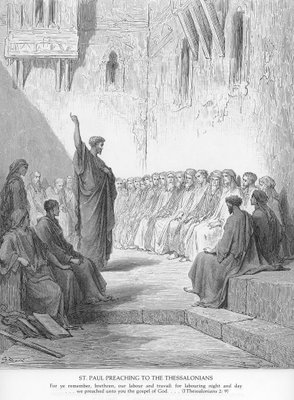For what partnership has righteousness with lawlessness?
Or what fellowship has light with darkness?
What accord has Christ with Belial?
Or what portion does a believer share with an unbeliever?
-Paul, 2 Corinthians 6:14-15
 The Apostle Paul above gives us one of the key principles in all of the NT concerning our role in the society in which we live: “do not be unequally yoked with nonbelievers.” It is echoing the imperative of the Apostle John we he says, “be in the world and not of the world.” Rightly understanding its truth has a profound impact in how we live, engage culture, and most importantly with whom we partner with in ministry.
The Apostle Paul above gives us one of the key principles in all of the NT concerning our role in the society in which we live: “do not be unequally yoked with nonbelievers.” It is echoing the imperative of the Apostle John we he says, “be in the world and not of the world.” Rightly understanding its truth has a profound impact in how we live, engage culture, and most importantly with whom we partner with in ministry.At the outset, when dealing with controversial and potentially divisive passages like this one, there can be ungodly attitudes expressed by name calling, cheap shot invectives, and attacking the person without ever having to wrestle with the actual text of Scripture pertaining to the matter at hand. I have sadly witnessed this as of late when a nugatory blogger took it on himself to point his sharp, unbridled tongue towards a pastor and a woman commenting on his blog about this issue for simply voicing a different view. Let me assure you, that will not be happening here in this article and will not be tolerated in the meta either. As you know, I am not shy when it comes to taking on issues and engaging in profitable, vigorous, even sometimes heated discussion. But careless venting and ranting designed to attack the person rather than biblically deal with the issue will not be allowed here (please read my blog rules if you are unclear of those guidelines).
Therefore, due to the recent confusion that some have made concerning this text, let me begin by stating what this passage is not teaching with the hopes of producing clarity on this important subject.
1. It is not a call to isolationism. This is not Paul’s call for all Christians to create an alternative society whereby we only by gas from Christian gas companies; pay taxes to Christian governments; drive cars made by Ichthus Motors; or purchase groceries from Galilean Grocers. Christians working for nonbelievers in an employee/employer relationship is not prohibited by Scripture. Doing business and trade with nonbelievers is not prohibited by Scripture. Being involved in community projects and events with nonbelievers is not prohibited by Scripture. But what is prohibited, is any kind of partnership in a spiritual enterprise or ministry involving making Christ known, preaching of the Word, evangelism, worship, the furtherance of the local church, etc. I will unfold that in just a minute.So those are three things that the Apostle is not meaning by the command: “do not be unequally yoked with nonbelievers.”
2. It is not a call to divorce your unsaved spouse. This passage isn’t specifically addressing the marriage issue (though it would apply) for the Apostle Paul has already given the command in 1 Corinthians 7:39 to “marry only in the Lord.” Considering marriage is the most intimate and binding of all human relationships, it would go without saying that it should be reserved for only believers to marry other believers. BUT, if you are married to a nonbeliever, the Apostle is not giving you an automatic out here. You are not to divorce your unbelieving spouse, but remain in that union praying for their regeneration.
3. And, it is not a call to avoid contact with nor having fellowship with nonbelievers. Paul again tells us for that to happen we would have to go “out of this world” (1 Cor. 5:9-10). How are we to love our neighbor if we don’t have contact with them? How can we serve them and do good works to them if we are not involved with their lives?
Paul using the Greek word: heterozugounten (bound together or unequally yoked) draws this analogy, however, not from the usage of the Greek term but from a concept back in Deuteronomy 22:10. When God was laying out prescriptions for the conduct of His people, He gave them a lot of prescriptions that on the surface are not particularly spiritual, they had to do with the uniqueness of Israel's life. But some of them were very practical and wise and one of the things that He instructed them, recorded in Deuteronomy 22:10 is that they were not to plow with an ox and an ass yoked together. And the reasons for that are obvious. Those two animals have two different natures. They don't have the same gait, they don't have the same disposition, they don't have the same strength. They don't have the same kind of instincts, completely different natures. You can't yoke them up and expect to plow a straight furrow.
To then “yoke” with a nonbeliever in a spiritual enterprise or ministry of any kind would be counterproductive wouldn’t it? Christians are new creations; walk in a newness of life; have different goals and purposes in living as born again followers of Jesus Christ. We live to please Him in all things and not ourselves. We see this world as not our home, but the land of our sojourning. Our lives have been separated from this world and unto Christ to now do His will, according to His Word, by His Spirit, in living out His gospel. It is undeniable - we are a new people. Therefore, Paul is giving a basic tenant for Christian living in whatever we do for the Lord; it cannot be in partnership with nonbelievers.
Now just in saying that, I am certain it opens up all kinds of questions and pragmatic considerations. Let’s begin to deal with them.
 In the 107 THESES that I penned ten years ago inspired by the wholesale buyout of Christian record companies in CCM (and publishers, bookstore chains, and greeting card companies have joined their ranks) I specifically addressed this issue in section six of that document. Here are some of those theses for your consideration:
In the 107 THESES that I penned ten years ago inspired by the wholesale buyout of Christian record companies in CCM (and publishers, bookstore chains, and greeting card companies have joined their ranks) I specifically addressed this issue in section six of that document. Here are some of those theses for your consideration:75. We cannot partner with the unbelieving world in a common spiritual enterprise or ministry. To harness unbelievers and believers in a Christ-centered endeavor is to be unequally yoked. (2 Corinthians 6:14-16)This is what Paul is essentially saying in this passage: there can be absolutely no partnership with nonbelievers in a spiritual enterprise or ministry - none. That would include trying to meld other faiths with the Christian faith for the sake of an ecumenical unity (syncretism). This would also include secular businesses who want to purchase Christian ministries or entities.
76. We must be separate from non-Christians in positions of ownership, authority or influence in the advancement of the gospel. (Ibid.)
77. The kingdom of light and the kingdom of darkness are two mutually exclusive worlds; two opposing societies; two converse communities that are incompatible and incongruous with each other in regards to the faith. (Ibid.)
78. One is characterized by righteousness, light, Christ, believers and the temple of God. Lawlessness, darkness, Belial, unbelievers and the temple of idols distinguish the other. One is based on God's truth-the other on Lucifer's lies. In matters of Christian faith and belief no partnership does or really can exist between these two realms. (Ibid.)
79. "To the pure all things are pure, but to those who are defiled and unbelieving nothing is pure; but even their mind and conscience are defiled. They profess to know God, but in works they deny Him, being detestable, disobedient, and disqualified for every good work." (Titus 1:15-16)
80. God is our Father and we, as His children, must disavow all praetorian religious and spiritual alliances with nonbelievers or we will forfeit the joy and blessing that flow from obedient fellowship in the Lord Jesus Christ. (2 Corinthians 6:17-18)
81. Satan's number one assault on the church is to infiltrate with error. He doesn't want to fight the church - he wants to join it. (John 8:44; 2 Corinthians 11:12-15; 1 Timothy 4:1)
82. Undiscerning believers think it a profound ministry strategy to join forces with unregenerate people in forwarding the gospel. Unwittingly, they harness Jesus Christ, the Worthy One, with Belial or Satan, the worthless one, in an unholy alliance - the very essence of being unequally yoked. (2 Corinthians 6:15)
83. "Ephraim is joined to idols. Let him alone." (Hosea 4:17)
84. We are not, however, called to isolationism. We are called to be salt and light in the world. We are to be faithful witnesses of God's mercy, love and grace to the lost and dying. We are to cultivate personal relationships with unbelievers, love our neighbor and our enemy, serve them and share our faith with them. (Matthew 5:13-16; 40-44)
85. We are to be in the world…but not of it - and this is our greatest challenge. Separation is not being divorced from contact with the world, but from complicity with and conformity to it. (1 John 2:15-17)
86. For instance, it is not unbiblical to consult non-Christian experts in matters of business, craft or trade (though whenever possible, Christian experts respected in these fields are preferable because of a shared integrity), but we can never engage in intimate binding, indissoluble relationships, alliances or partnerships that result in shared responsibility or authority for ministry purposes. (Deuteronomy 22:9-11; Philippians 2:14-15)
87. The promise of increased financial resources, wider distribution and a larger audience is not a justification for the surrender of our spiritual autonomy. (Luke 4:4-12; Ephesians 5:8-12)
When it is fashionable for unsaved people representing multi-national conglomerates, to buy up Christian based companies founded as ministries for the furtherance of the gospel and the name of the Lord Jesus Christ that have functioned in music, book publishing ministry, etc. - then we as a church today need to take a step back and evaluate this trend carefully through the lens of Scripture.
We must remember Paul's words in 2 Cor. 2:17,"we are not like many who peddle the Word of God for profit."
IOW, we are not like those who want to wholesale
the truth of God's Word as bargain bin merchandise
for the purpose and motive of financial gain.
There has never been a time where the gospel has been a popular thing in the world in which we live. There is an inherent offense to the cross beloved. It is not an acceptable nor enticing message to say to a lost world:
“If anyone comes to me and does not hate his own father and mother and wife and children and brothers and sisters, yes, and even his own life, he cannot be my disciple. Whoever does not bear his own cross and come after me cannot be my disciple. -Luke 14:26-27
I think it is not unlikely conclusion to assert that when the world around us finds the gospel we proclaim as an invitation for building up their bottom line, then the gospel that they are hearing is not the gospel of the Lord Jesus Christ at all. Just a watered-down substitute; a diluted glass of cheap grace masquerading as the genuine article.
My dear friend, Dr. John MacArthur, offers the following wisdom on this issue when saying:
”It's very much like modern Christianity today, by the way, that seeks to blend Christianity with popular culture, wants to make Christianity more popular, less different, more palatable, less offensive, less narrow, less exclusive. And the result of it is that true Christianity in the purity of God's Word gets corrupted by compromise and the church can become useless and shameful and blasphemous in mocking the truth. For believers there can be no compromise. We cannot engage ourselves with unbelievers in any spiritual enterprise. That's the issue. "Do not be bound together with unbelievers," that is what he commands that sets this text in motion. And it is an unmistakable call to believers to separate from unbelievers. No one could miss that that's what it's saying. The question is, what does it mean?This is the issue before us. When secular companies see Christian companies, designed for ministry in making Christ known, grow to a place where they are generating a lot of money, it is understandable why they would want to buy them up; expand that marketplace; and profit financially from that acquisition. I do not fault the world for that; I do fault, however, the believers for selling it to them - they should know better.
And as I said last time, it is essential to understand what it means but first of all what it does not mean. Paul is not saying, cut off all contact with non-Christians. He's not saying that because we have to reach them with the gospel. That is not the issue. He's not saying don't evangelize the unconverted, don't confront people in false religions. He's not saying that. We must do that.
The issue then is religious cooperation...
He is also not saying that you can't work or play or do business or be engaged in common earthly enterprise with unbelievers. He's not saying that, of course you can. What he is saying is you cannot link up with unbelievers in religious causes...or religious enterprises... You can't engage them in anything that involves ministry, teaching, or worship. Where there is ministry, teaching and worship there has to be absolute separation.
So he's referring in actuality to harnessing up believers and unbelievers in any common religious, spiritual enterprise. The two cannot be yoked together anymore than an ox and an ass can pull a straight furrow when under the same yoke, as Deuteronomy 22:10 forbids. But that is precisely what the Corinthians were doing.”
There will always be a “Simon the Sorcerer” who sees the crowds and the effects of the gospel and wants to “purchase with money the gift of the Holy Spirit.” But genuine ministry cannot surrender its spiritual autonomy and authority to nonbelievers - never.
This is what I told several CCM executives ten years ago when the Christian music industry was being bought out in accelerated rates. It is why I left the industry. I would be unequally yoked with nonbelievers in a spiritual enterprise or ministry if I would have stayed. Now I realize that the standard pragmatic, Arminian argument is: "but think of how many more CD’s or books or greeting cards we could sell? I mean, if EMI or Sony or Rupert Murdoch hadn’t bought us out, our Christ-centered products wouldn’t have made it into mainstream stores and think of how many wouldn’t have been reached if we didn’t do this?” Blah, blah, blah.
The world cannot own, operate, control, or manage Christian ministry designed to further the gospel; preach the Word; encourage worship; evangelism; discipleship, etc. It is forbidden. Those would seek to justify their alliances with nonbelievers in a spiritual enterprise or ministry are violating the clear command of God’s Word.
 Be in the world; be doctors, and lawyers, and factory workers; bankers; and politicians; and salesmen; and educators; and stock brokers; and models; and actors, musicians, and entertainers; and auto-workers; etc. that are honoring the Lord as faithful witnesses of the gospel to your employers and co-workers. BUT, if IBM, AT&T, General Motors, etc. wanted to own a Christian ministry it would be prohibited by God’s Word.
Be in the world; be doctors, and lawyers, and factory workers; bankers; and politicians; and salesmen; and educators; and stock brokers; and models; and actors, musicians, and entertainers; and auto-workers; etc. that are honoring the Lord as faithful witnesses of the gospel to your employers and co-workers. BUT, if IBM, AT&T, General Motors, etc. wanted to own a Christian ministry it would be prohibited by God’s Word.But don't be of the world: why would any Christian involved in ministry go to nonbelievers to solicit their financial support to further their spiritual enterprise or ministry anyway? Can you imagine Paul appealing to Nero to bank roll through corporate acquisition the ministry? Unfathomable. That is for individual believers and the local church to fund (1 Cor. 9:1-18; 3 John 5-9). What the world needs to hear is not a business plan by Christian publishers, music companies, greeting card companies and the like to expand their bottom line, shelf space, and market Q; what they need to hear is the gospel of the Lord Jesus Christ - to repent of their sins, forsaking all to follow Him.
Be in the world; be involved in your communities; love your neighbors; do good work at your place of employ; honor the Lord with excellence in those things.
Amen?
The combox is yours.






















